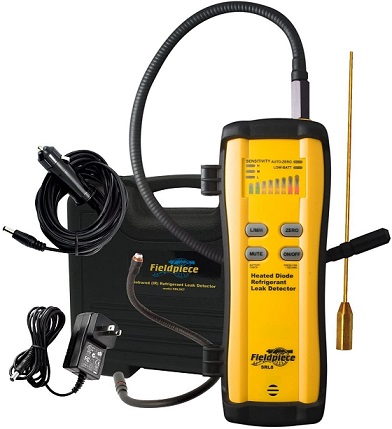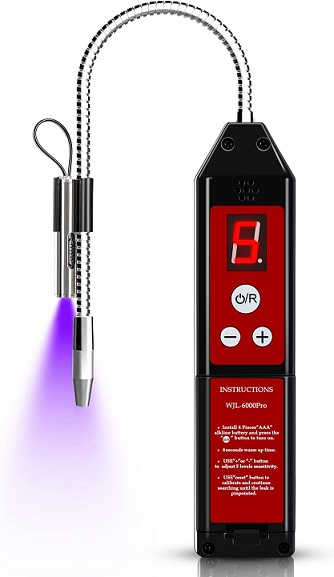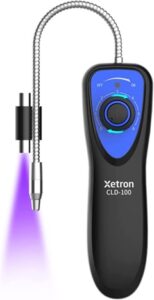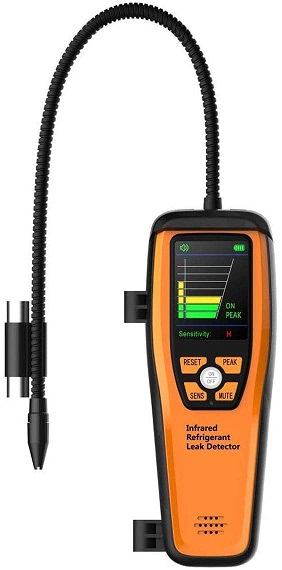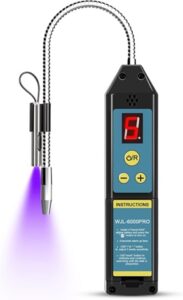Refrigerant Leak Detectors are essential tools used in HVAC systems to identify and locate leaks of refrigerant gases. These detectors play a crucial role in maintaining the efficiency and safety of refrigeration systems by promptly detecting leaks that could lead to environmental harm and energy wastage.
We’ve adopted a stringent approach, evaluating each detector based on key factors:
- Sensitivity: Our recommended sensitivity of 0.1 oz/year ensures refrigerant leak detectors excel in pinpointing even the tiniest leaks, meeting high standards for diverse environmental conditions.
- Sensor Life: We recommend a minimum 365-day sensor life, guaranteeing reliable performance over time. Our assessments dive deep into how detectors maintain accuracy during prolonged use, assessing durability and cost-effectiveness.
- Battery: Lithium batteries offer longevity and reliability. With a suggested minimum of 3000mAh, our reviews unveil insights into the practicality and efficiency of refrigerant leak detectors’ power sources during extended usage.
Explore our “Buying Guide” to streamline your decision-making and choose the ideal refrigerant leak detector for your needs.
Best Refrigerant Leak Detectors: Table
| Refrigerant Leak Detectors | Sensitivity | Sensor Life | Buy Now |
|---|---|---|---|
| Aprvito Refrigerant Leak Detector | 0.11 oz/year | 50 hours | Check On Amazon |
| Xetron Refrigerant Leak Detector | 0.21 oz/year | 24 hours | Check On Amazon |
| Elitech Refrigerant Leak Detector | 0.14 oz/year | 10 hours | Check On Amazon |
| Inficon Refrigerant Leak Detector | 0.25 oz/year | 100 hours | Check On Amazon |
| Simbow Refrigerant Leak Detector | 0.14 oz/year | - | Check On Amazon |
| Fieldpiece Refrigerant Leak Detector | 0.03 oz/yr | 18 hour | Check On Amazon |
| Robinair Refrigerant Leak Detector | 0.03 oz/yr | - | Check On Amazon |
Top Refrigerant Leak Detectors Reviews
1. Aprvito Refrigerant Leak Detector
When you need to find leaks in your air conditioning, the Aprvtio Refrigerant Leak Detector is a great tool. It has a special light that helps you see leaks, even in the dark. The upgraded WJL-6000Pro model is even better at finding leaks and showing them on its screen. It can work for a long time without needing new batteries, which is handy.
You can easily adjust the settings and see the leak levels on the screen. If there’s a leak, it makes noise and flashes lights to help you find it quickly. This detector works with different types of coolants, so it’s useful for different situations. Whether you’re a professional or just fixing things at home, the Aprvtio Refrigerant Leak Detector helps you find and fix leaks, so your air conditioning keeps working well.
Specifications
- Maximum Sensitivity: 0.14oz/yr.
- Probe Length: 16 inches
- Battery Type: Li-3000mA/h
- Compatible Devices: R22, R410A, R134A, R1234YF, CFCs, HCFCs, HFCs
Pros
- Upgraded sensitivity for precise detection.
- Visual and audible alarms for efficiency.
- A flexible sensing tip enhances maneuverability.
- Extended battery life for prolonged use.
Cons
- LCD screens may be challenging to read in bright environments.
2. Xetron Refrigerant Leak Detector
The Xetron HVAC Refrigerant Leak Detector is equipped with advanced technology approved for accuracy, ensuring it doesn’t give false alarms like soap bubbles might. The inclusion of a UV light and flashlight enhances visibility during leak checks.
This device features adjustable sensitivity settings, allowing you to customize it to find leaks according to your needs. It has a quick warm-up time and sets itself up without any waiting, making it efficient for detecting gas leaks. With a full day of uninterrupted operation, it can detect various types of coolants, catering to both professionals and do-it-yourself enthusiasts.
Specifications
- Operating Humidity: 95 percent
- Sensor Type: Ionization
- Probe Length: 7.87 inches
- Product Dimensions: 2″D x 2.5″W x 7″H
- Weight: 0.34 Pounds
Pros
- Versatile refrigerant compatibility for various applications.
- Adjustable sensitivity modes for customization.
- Swift warm-up time for quick detection.
- Certified to standards, reducing false alarms.
Cons
- Limited to the ionization sensor type.
3. Elitech Refrigerant Leak Detector
The Elitech HVAC Refrigerant Leak Detector is a valuable tool for identifying air conditioner leaks. With a robust sensor, it excels in detecting specific gases commonly present in air conditioners, especially those used in automobiles.
This adaptable tool can be customized to detect leaks in different ways, adhering to industry standards to ensure consistent and reliable performance. Its screen displays informative details, aiding in precisely identifying leak locations. Featuring user-friendly attributes, quiet operation, and extended durability, the ILD-200 proves advantageous for both professionals and enthusiasts involved in the maintenance of heating, ventilation, and air conditioning (HVAC) systems, as well as automotive repairs.
Specifications
- Sensor Life: ≥10 years
- Max Sensitivity: 0.14 oz/yr
- Response Time: ≤1s
- Probe Length: 15.5 inches
- Operating Temperature: -10°C to 52°C (14°F to 125.6 °F)
- Operating Humidity: 50%~85%RH
Pros
- Extended sensor life for long-term use.
- Adjustable sensitivity levels for versatility.
- Large LCD display for clear indication.
- Reliable detection of various halogen refrigerants.
Cons
- Limited to infrared sensor type.
4. Inficon Refrigerant Leak Detector
The Inficon Refrigerant Leak Detector is equipped with a reliable heated diode sensor, ensuring precise and trustworthy leak detection. It features convenient elements like automatic background adjustment and operates on two D-cell alkaline batteries for easy use. With A2L certification, it aligns with industry standards, providing an additional level of confidence.
Technicians value the practical inclusion of a sturdy carrying case, boosting the detector’s portability and durability. Manufactured in the United States, the Inficon leak detector also extends dedicated technician support through email and phone, assuring users of reliable guidance.
Specifications
- Sensitivity: 0.25 oz./year (7 g/year)
- Detects all CFCs, HCFCs, HFCs, and HFOs. A2L Certified
- Proven heated diode sensor for reliable leak checking
- Sensor Life: 100 hours
Pros
- No false alarms from soap solutions
- Runs on two D-cell alkaline batteries
- Rugged carrying case included
- US Technician Support via Email and Phone
Cons
- High initial investment cost.
5. Simbow Refrigerant Leak Detector
The Simbow Refrigerant Leak Detector is good at finding where refrigerant gas is leaking. The WJL-6000Pro model has a flexible tip, making it useful in different places.
It has a special light with colors, one that helps in the dark and another for special liquids. The new screen shows important information and beeps loudly if there’s a leak. It works for a long time with small batteries, making it easy to use. If there’s a leak, it beeps and shows a message on the screen.
Specifications
- Higher sensitivity of up to 0.14oz/yr.
- Flexible 7.9-inch sensing tip for versatility.
- Two-color LED light with a UV lamp and flashlight.
- Battery: Runtime of 50 hours with 4 AAA batteries.
- Audible and visual alarms with multi-alarm functions.
- Item Weight: 7.8 ounces
Pros
- Higher sensitivity for accurate detection.
- Compatible with refrigerants R22, R410A, R134A, and more.
- User-friendly LCD screen and controls
- Prolonged runtime with AAA batteries
Cons
- Relatively shorter sensing tip length.
6. Fieldpiece Refrigerant Leak Detector
 Fieldpiece offers two primary refrigerant leak detectors, and the DR58 is an excellent option for technicians who need a reliable and portable detector. It features a heated diode sensor that is highly sensitive, capable of detecting smaller leaks than traditional soap bubble methods.
Fieldpiece offers two primary refrigerant leak detectors, and the DR58 is an excellent option for technicians who need a reliable and portable detector. It features a heated diode sensor that is highly sensitive, capable of detecting smaller leaks than traditional soap bubble methods.
The display is easy to read, showing both clear bars and a numerical value to help you monitor the intensity of the leak. Additionally, a flashing red LED tip provides extra detection capability, allowing you to find leaks without constantly watching the screen. Although the sensor will need to be replaced periodically, the DR58’s long 18-hour battery life and durable construction make it a trustworthy tool for daily HVAC tasks.
Specifications
- Maximum Sensitivity: 0.03 oz/yr (1g/a)
- Probe Length: Standard
- Battery Type: Rechargeable lithium-ion
- Compatible Devices: A2L compatible
- Detects all HFC, CFC, HCFC, HFO and blends
Pros
- Superior sensitivity for comprehensive leak detection.
- Bright LCD screen with bar graphs and numeric readings.
- Long-lasting rechargeable battery.
- Rugged design with multiple alarms and flashing tips.
Cons
- The price may be higher compared to similar models.
7. Robinair Refrigerant Leak Detector
 If you’re looking for a trustworthy product similar to Fieldpiece, we recommend the Robinair Refrigerant Leak Detector. This modern tool is designed for detecting leaks in HVAC systems. It features a color graphic LCD screen that uses bar graphs and sweep modes to display leak sizes, making it easier to pinpoint leaks accurately.
If you’re looking for a trustworthy product similar to Fieldpiece, we recommend the Robinair Refrigerant Leak Detector. This modern tool is designed for detecting leaks in HVAC systems. It features a color graphic LCD screen that uses bar graphs and sweep modes to display leak sizes, making it easier to pinpoint leaks accurately.
The detector offers three sensitivity levels and includes a 17-inch probe, ensuring both versatility and precision. It works with common refrigerants like R-134a and 1234yf. An audible alarm notifies users of leaks, and UV LED lights enhance the visibility of UV dye, helping to spot leaks even in dim lighting.
Specifications
- UV Wave-Length: 395-415 nanometers
- Probe Length: 17 inches
- Battery Type: 4 AA batteries (included)
- Compatible Devices: Universal fit for HVAC systems
Pros
- Innovative color graphic display
- Adjustable sensitivity levels
- Long-lasting sensor with up to 10 years of life
- Lightweight and easy to use
Cons
- Limited compatibility with certain refrigerants like R-123.
Buying Guide For the Best Refrigerant Leak Detector
Refrigerant leaks can be detrimental to both the environment and your wallet. Detecting these leaks early is crucial, and having the right tool for the job is essential. In this buying guide, we will explore the key features to consider when selecting the best refrigerant leak detector to ensure efficiency, accuracy, and reliability in safeguarding your HVAC systems.
1. Sensitivity
If you want a given refrigerant leak detector to work properly, then it needs to be sensitive enough to detect small leaks. There are a lot of cases when the refrigerant might leak in a very small amount. But even this small amount can affect the cooling performance by a lot over time.
Thus, a given leak detector should be highly sensitive and able to detect small leaks as well. As a result, these refrigerant leak detectors come with a sensitivity rating like 0.25 oz/year or 0.15 oz/year. Out of these two options, the later lower rating is better since it offers higher sensitivity as it can detect much smaller refrigerant leaks.
Generally, these refrigerant leak detectors come with controls that allow you to adjust this sensitivity as per your needs.
2. Sensor Life
The longevity of the sensor in a leak detector directly impacts its overall performance and maintenance cost. Opt for models with durable sensors, often made from advanced materials like heated diodes or infrared technology. Longer sensor life translates to extended periods between replacements, reducing downtime and expenses.
In some cases, this sensor life is given in days as 100 days or 200 days. You can also find a few refrigerant leak detectors that offer a much longer sensor life in years. Such leak detectors are made for heavy-duty usage and ideal for long term usage.
3. Battery And Battery Life
The efficiency of a refrigerant leak detector is contingent upon its power source. Choose detectors with reliable batteries, such as lithium-ion, and ensure they are easily replaceable. Consider models with extended battery life to guarantee uninterrupted usage during critical leak detection tasks.
4. Accuracy
Precision is non-negotiable when dealing with refrigerant leaks. Look for detectors that boast high accuracy levels, ensuring that identified leaks are genuine and not false positives. Calibration features further enhance accuracy, allowing users to fine-tune the detector for specific environments.
5. Response Time
A Quick response time is essential in detecting leaks promptly. Delays can lead to escalated environmental impact and system damage. Opt for detectors with rapid response times, enabling quick identification and mitigation of refrigerant leaks.
4. Supported Refrigerants
If you are familiar with refrigerants and cooling equipment like refrigerators and AC, then you must know that there are a lot of different gases that get used as a refrigerant. Because of this, some specific refrigerant leaks might not be detected by a given detector.
To overcome this issue, you should get a refrigerant leak detector that supports a wide range of refrigerants and detects them properly in case of a leak. Thankfully, almost all refrigerant leak detectors come with a list of various supported refrigerants that you should check. It includes various CFCs, HFCs, HCFCs, and other refrigerant types, as well as their mixes.
5. Portability
The mobility of a refrigerant leak detector is crucial for efficiently navigating complex HVAC systems. Consider lightweight and compact models with ergonomic designs. Some detectors may come with features like flexible probes or telescoping wands to access challenging areas easily.
Refrigerant Leak Detectors – FAQs
Ans: Refrigerant leak detectors typically employ sensors to detect the presence of refrigerant gases in the air. Some use heated diode sensors, ultrasonic technology, or infrared sensors to identify leaks by measuring changes in concentration.
Ans: No, different detectors are designed for specific refrigerants. Ensure your chosen detector is compatible with the refrigerant used in your system. Most models indicate the refrigerant type they are optimized for.
Ans: Yes, advanced detectors can distinguish between minor and major leaks. They often have adjustable sensitivity settings, allowing users to fine-tune the device for various leak sizes.
Ans: Regular checks are recommended, especially during routine HVAC maintenance or if you notice a decline in system performance. Some detectors can be used periodically as a preventive measure.
Ans: Yes, most detectors are designed with user-friendly interfaces. Manufacturers provide clear instructions, and many models offer audible or visual alarms to make leak detection straightforward.
Ans: Yes, there are detectors specifically designed for automotive use. They are portable and can identify leaks in car air conditioning systems.
Ans: Yes, calibration is crucial for accurate readings. Most detectors come with calibration tools and instructions, and regular calibration ensures reliable performance.
Ans: Yes, many detectors are designed to operate in a wide range of temperatures. However, it’s essential to check the specifications to ensure suitability for extreme cold conditions.
Ans: The lifespan varies, but with proper care and maintenance, detectors can last for several years. Regularly checking and replacing sensor elements, if applicable, can extend the lifespan.
Ans: Yes, it’s important to follow the safety guidelines provided by the manufacturer. Ensure proper ventilation, use personal protective equipment, and follow recommended procedures to minimize any potential risks during detection processes.
Conclusion
When it comes to pinpointing refrigerant leaks, several excellent detectors are available. Here are three top contenders to consider:
- For value and versatility: The Aprvito Refrigerant Leak Detector offers halogen detection for a wide range of refrigerants at an affordable price. Its LED light provides a clear leak indication.
- For long-lasting performance: The Elitech Refrigerant Leak Detector boasts a remarkable 10-year sensor life, making it a cost-effective choice in the long run. It utilizes infrared technology for accurate leak detection.
- For professional applications: The Inficon Refrigerant Leak Detector is a professional-grade detector known for its high accuracy and sensitivity. While it might be pricier, it’s ideal for technicians who need top-of-the-line performance.
Ultimately, the best detector depends on your specific needs and budget. Consider factors like refrigerant type, desired features, and frequency of use to make an informed decision.

